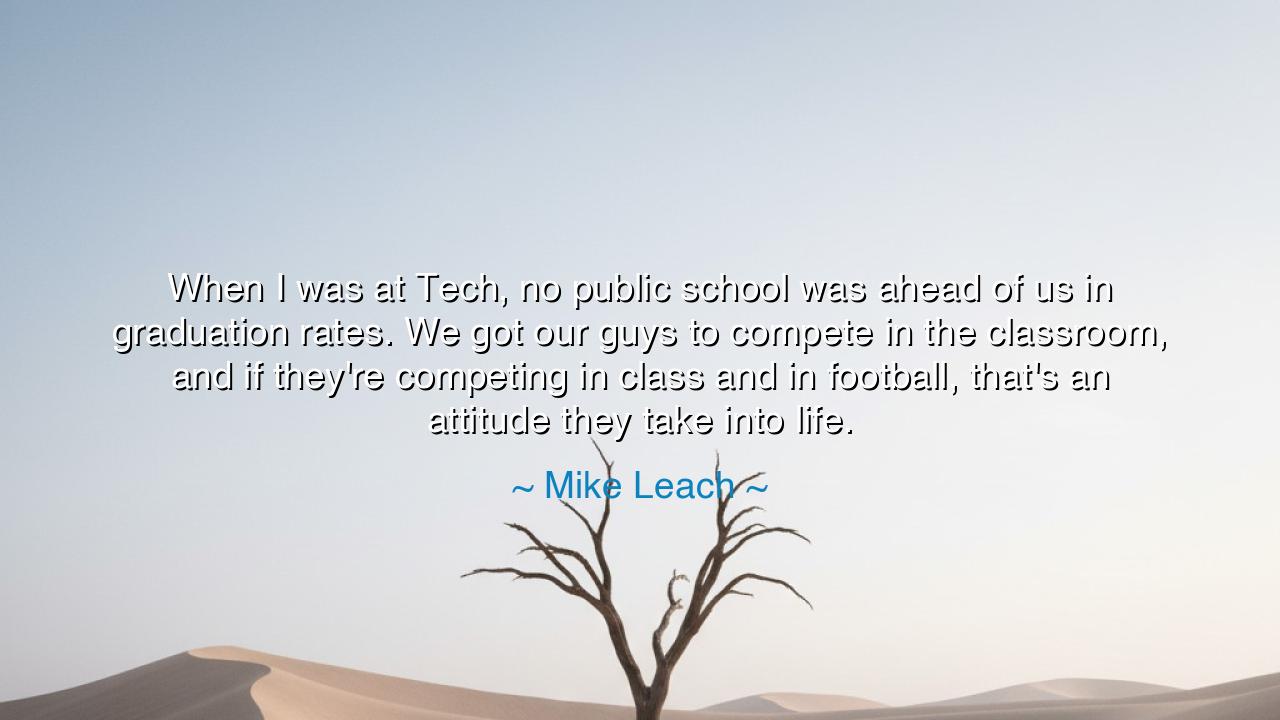
When I was at Tech, no public school was ahead of us in
When I was at Tech, no public school was ahead of us in graduation rates. We got our guys to compete in the classroom, and if they're competing in class and in football, that's an attitude they take into life.






In the proud and disciplined words, “When I was at Tech, no public school was ahead of us in graduation rates. We got our guys to compete in the classroom, and if they're competing in class and in football, that's an attitude they take into life,” Mike Leach speaks with the voice of a coach who understood that victory is not confined to the field — it is a way of being, a lifelong art of striving toward excellence. Beneath his rugged tone lies a timeless truth: that the warrior’s spirit is not forged by talent alone, but by character — by the will to compete honorably, to persevere relentlessly, and to seek mastery in every arena of life. Leach reminds us that education and sport are not separate paths, but parallel disciplines in the pursuit of greatness.
The origin of this quote arises from Leach’s remarkable tenure as head football coach at Texas Tech University, where he transformed a once-overlooked program into a national force. Known for his unorthodox strategies and intellectual approach to the game, Leach demanded as much excellence in the classroom as on the field. His players were not just athletes — they were students of both mind and body. Under his guidance, Texas Tech achieved one of the highest graduation rates among public universities, a feat that symbolized his philosophy that true competition is holistic. The scoreboard mattered, but the shaping of disciplined, educated men mattered more.
In the style of the ancients, we may say that Leach saw in his players the reflection of the Greek ideal — the kalos kagathos, the beautiful and the good — a harmony between physical prowess and intellectual virtue. The athlete who excels only in strength is incomplete; the warrior must also train the mind, for intellect guides courage as the helm guides the ship. Leach’s insistence that his players “compete in the classroom” was not about grades alone, but about cultivating attitude, the inner fire that drives a man to excel whether the crowd is roaring or silent. In this, his wisdom joins the lineage of philosophers who taught that mastery of self precedes mastery of craft.
The spirit of this philosophy echoes through the stories of history. Consider Leonidas of Sparta, who led his warriors at Thermopylae not merely as soldiers, but as disciplined citizens trained from youth in both arms and intellect. Their greatness was not born of blind aggression but of disciplined unity, forged through years of mental and physical training. They faced death with calm because they had long been taught to compete with honor, whether in the gymnasium, the agora, or the battlefield. So too did Leach seek to raise men who could meet the world — not merely as players of a game, but as students of life.
There is also a deep moral resonance in Leach’s words. To “compete in life” is not merely to seek victory, but to embrace struggle with integrity. The competition of which he speaks is not against others, but against one’s own complacency. A man who learns to compete in the classroom learns to think, to persist, to refine himself. A man who competes in sport learns resilience, teamwork, and humility. When both disciplines unite, the result is a character prepared for the long game — for the inevitable tests of fate that await beyond graduation. In Leach’s view, the classroom and the field were not separate battlegrounds, but sacred arenas where the soul was tested and strengthened.
The meaning of his reflection, therefore, is not merely educational but existential. It teaches that greatness cannot be compartmentalized — that excellence in one realm must spill into all others. The man who brings effort, curiosity, and discipline to his studies will carry those virtues into his work, his relationships, and his destiny. The one who trains both mind and body learns to face life’s unpredictable storms with grace. Competition, rightly understood, is not about domination, but about becoming the fullest expression of one’s potential.
The lesson is clear and enduring: success is not a matter of specialization, but of integration. Strive to be complete — to learn, to train, to think, to fight — and let each pursuit strengthen the other. Whether you are an athlete, an artist, or a scholar, bring the same fire to every endeavor. For as Mike Leach reminds us, the way you do one thing is the way you do everything.
And the practical action is this: approach every field of life as an arena of discipline. Do not divide your excellence; unify it. Compete in your studies as fiercely as in your craft, and live with the understanding that every effort builds the same muscle — the muscle of character. When you step into the world, carry with you the attitude of the warrior-scholar, the one who seeks not just to win, but to grow. For when mind and body, thought and action, unite under purpose, the result is not merely achievement — it is greatness that endures beyond the game.






AAdministratorAdministrator
Welcome, honored guests. Please leave a comment, we will respond soon